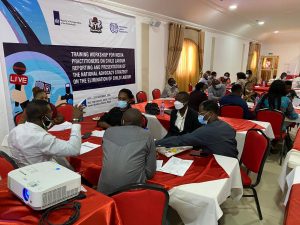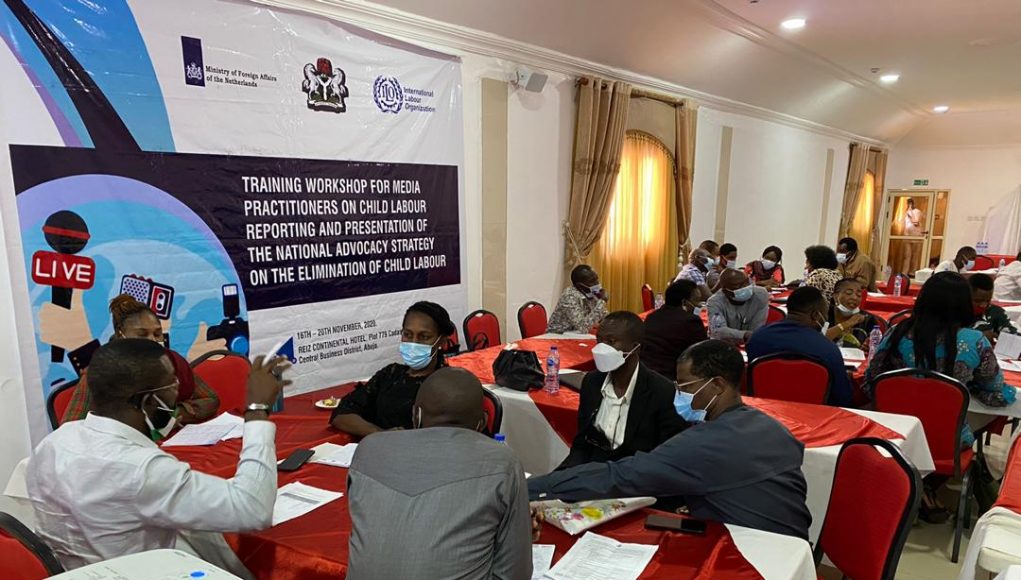
Journalists at the Child Labour Reporting training session in Abuja
By Christian Appolos
The International Labour Organization’s (ILO) Country Office in Nigeria, has stressed the need to engage media practitioners in the fight for the elimination of child labour, and promotion of behavioral change in matters thereof.
According to a communique raised and made available to journalists by Agatha Kolawole, National Project Coordinator ACCEL AFRICA Project, ILO Country Office Abuja, at the end of a 3-day training workshop for journalists in Abuja, in collaboration with the Federal Ministry of Labour and Employment, the UN labour agency, stressed the need to ensure that journalists and media practitioners have a better understanding of main concepts and conventions on child labour; and possess improved understanding on child labour issues and capacity to ensure effective and accurate reporting.
The 3-day training workshop tagged: Journalists and Media Professionals Training on effective child labour reporting and presentation of the National Advocacy Strategy on the Elimination of Child Labour in Nigeria, further noted the necessity to; “established a strong link between media personnel at the states and implementing partners, strengthen the capacity of media practitioners to increase and improve on the quality and quantity of their reports on child labour cases which promotes positive behavioural change, increase quantum of information on Child Labour in Nigeria, especially in Ondo, Niger, FCT and/or Lagos state; and get media professionals to understand Child Labour and skills on investigative reporting and the application of solutions journalism to the issue of child labour, which hopefully will lead to positive behavioral change in the society.”
Furthermore, the communique recommended that; “Collaborating agencies responsible for the promotion of child labour issues, such as NOA be strengthened with enough funds and enhanced capacity (Including its film and theatre arm) to be able to carry out its advocacy duties.” It also stressed that; “Management of the NOA needs to engage more with media practitioners to amplify its messages on relevant government policies relating to child labour. Also needed by the NOA is more transparency from other agencies and departments of the government on their projects in order to create common grounds for collaboration on identified issues.”
More so, the communique noted that; “The Media needs to be engaged at the editorial and gatekeeping levels in order to have their buy ins and make the jobs of reporters easier, thereby placing child labour issues on the front burner of regional, national and local discourse.
“On their part, Journalists must win over and court the professional fancy of theireditors, managers, and media gatekeepers in their anti-child labour reporting to ensure their stories and reporting plans are supported at the highest levels.
“Media professionals and their entire Newsrooms should not work in silos but collaborate more by following up on the reports published by other media organisations and by forming networks or coalitions to collectively work on particular story ideas. This is besides taking full advantage of social media handles.
“Advocacy groups including but such as the NOA should consider the cultural realities and preferences of a people before introducing alien solutions or alternatives to them.
“Advocacy groups should rebroadcast relevant reports from media organisationson their social media and other platforms in further amplifying conversations around child labour.
“Efforts must be made to get government officials to cooperate adequately with journalists especially when it comes to access to information and should note that response time for media enquiries have to be fast enough to match the quick pace of press work.
“The Ministry of Labour and other relevant stakeholders such as the International Labour Organization (ILO) should share contacts of their response or help desks with journalists as a way of building the communication gap with the media.
“The Ministry of Labour and ILO should facilitate the processes by which media professionals reach out to focal points in the MDAs, law enforcement agencies, Civil Society and faith based Organisations that are relevant to the elimination of child labour in order to aid effective reportage.
“Media professionals should familiarize themselves with, cite and draw strength from sister instruments from other international organisations such as the ECOWAS Regional Action Plan on the Elimination of the worst forms of Child Labour in the fight against the menace.”
Participants at the workshop includes 30 journalists drawn from the broad spectrum of print, electronic and online media including communication officers from, the Nigerian Labour Congress (NLC), Trade Union Congress (TUC), ECOWAS, NOA, Nigerian Employers Consultative Association (NECA) and Ministries of Mines, Labour and Employment as well as a resource person.






























